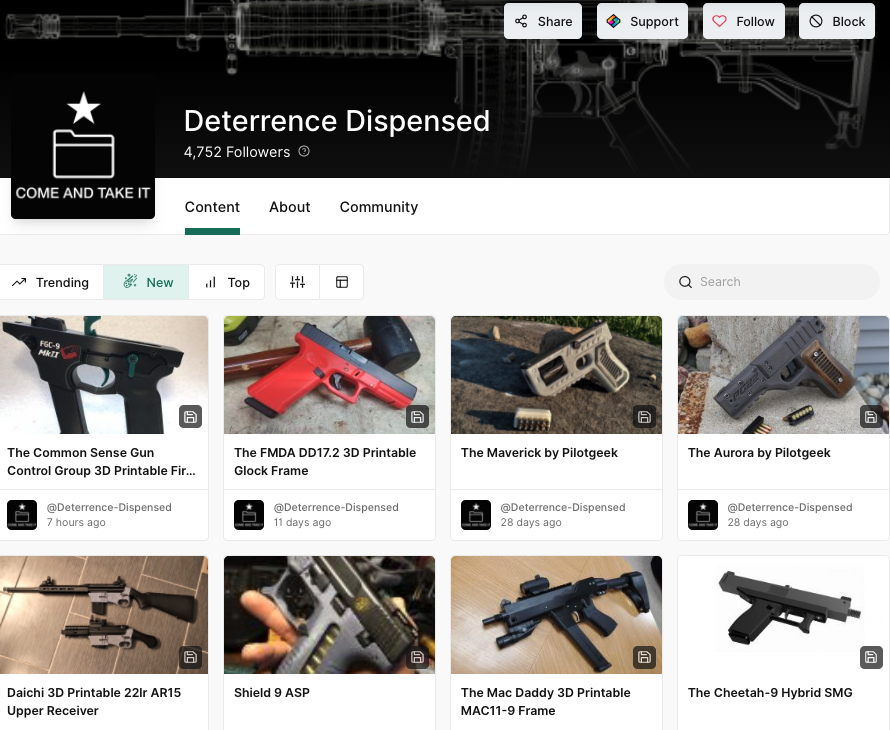Domestic terrorists and racially motivated extremists are increasingly arming themselves with homemade, untraceable “ghost guns,” a threat that is now a top public safety concern for law enforcement, according to a leaked U.S. government report.
The six-page report by the Joint Counterterrorism Assessment Team — a coalition of federal law enforcement and intelligence agencies, including the FBI — warns that such extremist groups are gravitating to guns and gun accessories that can be made using do-it-yourself kits or 3D printers. Ghost guns can be acquired without background checks and their lack of serial numbers makes them nearly impossible to trace, complicating criminal investigations.
Law enforcement recovered nearly 24,000 unserialized weapons at crime scenes between 2016 and 2020, the report shows. The number of ghost guns found in the possession of convicted felons and other so-called prohibited persons doubled from 2018 to 2019. The report, dated June 22, was circulating online before The Trace and NBC Bay Area confirmed its authenticity through federal law enforcement sources.
Politicians, local police, and gun control advocates have been sounding alarms about ghost guns for years. In May, the Justice Department proposed a rule that would require retailers to run background checks before selling gun-making kits and force kit manufacturers to stamp a serial number on certain key parts. The move was part of a broader effort by President Joe Biden to combat gun violence following high-profile mass shootings in Boulder, Colorado, and Atlanta.
The counterterrorism report urges investigators to be on the lookout for criminals using false identification to obtain 3D printing services, ordering large quantities of weapon parts to states with restrictive gun laws, and conducting online searches for how to assemble undetectable firearms.
“Whether you are international terrorists, domestic terrorists, or violent extremists… they don’t want to have anything that traces them back,” said Mike Sena, director of the Northern California Regional Intelligence Center, a joint law enforcement intelligence hub. “Their go-to is to try to get a hold of a private firearm because of the belief that [law enforcement] will never be able to figure out where this weapon came from.”
The report refers to ghost guns as “Privately Manufactured Firearms,” or PMFs, an umbrella term encompassing not only guns made with 3D printers and kits but also modifications and accessories that can convert semiautomatic firearms into machine guns.
Criminals and terrorists have begun exploiting the reduced prices and increased availability of gun parts and related manufacturing tools, creating and modifying weapons for use in white supremacist plots and arms trafficking schemes, according to the report. Because they can be easily acquired without a background check and are difficult to trace if recovered at a crime, PMFs have become a popular means of obtaining deadly firepower outside the government’s purview.
Contact Us
Learn how to contact our reporters securely.
“Illicit actors may seek PMFs to circumvent security, avoid some state government regulations, and evade detection of and complicate law enforcement investigative efforts,” the report says. “PMFs do not have serial numbers, thereby severely degrading an investigator’s ability to track the firearm through traditional methods, including owner and manufacture date.”
Numbers regarding how often law enforcement agencies encounter ghost guns have historically been hard to come by. A 2019 investigation by The Trace and several local NBC TV stations found that 30 percent of all firearms recovered in California by the Bureau of Alcohol, Tobacco, Firearms and Explosives were unserialized. Figures provided to NBC Bay Area show that recoveries by San Francisco police surged from six ghost guns in 2016 to 164 ghost guns in 2020. A similar trend has unfolded in Oakland, where police said they recovered 206 ghost guns in 2020, almost four times the number from 2019.
Ghost guns have surfaced in the hands of white supremacists around the country. Police outside Seattle in 2019 seized ghost gun materiel from the leader of a neo-Nazi guerrilla organization implicated in several homicides and bomb plots. The following year in Maryland, federal agents arrested three white supremacists after they manufactured an AR-15 ghost gun using a component that could be purchased online for as little as $50. And in North Carolina, a grand jury in July indicted a 21-year-old national guardsman for allegedly supplying ghost guns to members of a white nationalist group who’d appeared in videos giving the “Heil Hitler” salute.
Sena says that, for federal authorities and local law enforcement, the ability for criminals to bypass background checks to gather arms makes preemptively stopping a large-scale attack difficult.
“If you’re a member of a terrorist organization or a violent extremist group or you’re just somebody that wants to commit a mass casualty attack, the problem is that, prior to that event, we have no indicators that that person has a weapon,” Sena said. “When we run that person for firearms, nothing will show up.”
The original version of this article wrongly stated that law enforcement had recovered nearly 24,000 ghost guns between 2016 and 2020. It has been corrected to say that over that five-year period, law enforcement recovered nearly 24,000 unserialized weapons, which includes ghost guns but also firearms with obliterated serial numbers and firearms that were manufactured before serialization became a legal requirement.

